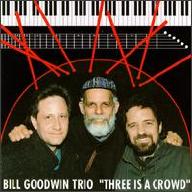Born in 1942 in Los Angeles, Goodwin grew up in an entertainment family the son of Bill Goodwin, announcer and actor on the classic Burns Allen radio and television programs. Interested in music, he started out on piano at age five and saxophone at age 12. However, by his teens Goodwin was also a talented drummer, having taught himself how to play after discovering the music of West Coast jazz drummer Shelly Manne. He was soon playing gigs and made his professional debut at 17 with saxophonist Charles Lloyd. More work followed, including stints with Mike Melvoin, Bud Shank, Frank Rosolino, Art Pepper, Paul Horn, and Gabor Szabo. He was also a regular with Howard Rumsey's Lighthouse All Stars. In the latter half of the '60s, Goodwin backed pianist George Shearing, and even found himself on disparate sessions with Jefferson Airplane, Steve Allen, and Mose Allison.
Goodwin's playing continued to evolve in a more progressive direction in the early '70s through affiliations with vibraphonist Gary Burton, which brought him to the East Coast. Japanese pianist Toshiko Akiyoshi and tenor saxophonist Stan Getz were other playing partners, the latter artist particularly pushy with a cutting-edge direction in this period. There was also still plenty of straight-ahead jazz work from the drummer, including sessions with Chuck Israels' National Jazz Ensemble, as well as tenor saxophonists Al Cohn and Zoot Sims. In the mid-'70s, Goodwin formed a close association with saxophonist Phil Woods, contributing to albums like the Grammy-winning Live from the Showboat, and the Grammy-nominated New Phil Woods Album and Song for Sisyphus. He continued to augment the straight-ahead bop drumming with his talents for backing vocalists, performing with Bob Dorough on the animated Schoolhouse Rock recordings, as well as the Manhattan Transfer. Goodwin also began touring and recording with Tom Waits, appearing on the acclaimed singer/songwriter's classic live album Nighthawks at the Diner.
In the late '70s, the drummer began leading his own groups and made his debut with 1981's Solar Energy, playing alongside guitarist John Scofield, pianist Bill Dobbins, bassist Steve Swallow, and drummer Steve Gilmore. He followed up with 1988's aptly titled quartet album Dave Liebman Steve Gilmore Bill Goodwin Play the Music of Cole Porter. A year later, he joined pianist Hal Galper and bassist Billy Peterson for No Method. Around this time, Goodwin also established himself as a producer, working on more albums with altoist Woods, as well as projects for Keith Jarrett, Tom Harrell, and others. In 1994, he paired with guitarist Vic Juris and organist Craig Kastelnik for the trio album Three Is a Crowd.
For 2013's Raise Four, Goodwin collaborated with saxophonist Adam Niewood, pianist Pat Bianchi, and bassist Chris Higgins. Niewood was also on board for the drummer's 2017 live album At the Lafayette Bar. Two years later, he returned with Trio, featuring his group with pianist Jon Ballantyne and bassist Evan Gregor. ~ Matt Collar, Rovi













